|
This morning I woke up to a couple of maggots falling on my head. Since I moved into my cabin, I have had one or two rats entering into the ceiling where the insulation is and possibly nesting. Frequently I have heard them scuttling about, scratching, gnawing, and occasionally squealing with antagonism at another. It is usually only one at a time, and I have thrown the sides of my clenched fist banging against the ceiling to scare them and hopefully either shoo them away or just shut them up from fright. And that was usually when I noticed much upheaval of accumulated rat droppings on the other side of the plywood where they were living. The ceiling has two 1.5x1m (aprox.) sheets of plywood over the room, a narrow skylight with two PC sheets doubled over top of each other, and directly above the bed two narrow half sheets of plywood covering that end. About a month ago, after waiting for a sunny weekend, I ripped the corrugated iron roofing off the bed end and found lots of droppings that I cleaned up, but couldn't find any obvious entry points for the rat to get in from the outside, only pathways into that area from the other area. Two weeks ago, I attacked the other side pulling off the roofing and again, finding no rats but many rat droppings. But this time, after doing some research, I sprinkled the insulation and general area with pepper, paprika, and oregano to use as deterrents while also dropping some rat poison in one of it's travel paths, and down where some of the insulation was. I think the deterrent worked, as there was no more scuttling in that larger area of ceiling, but over the bed, the rat came back. Last night I heard a rat scurrying about, but then went quiet. This morning the maggots came to visit. Now, let me be clear, I expected there to be a dead rat up there: when the weather did heat up in the afternoon the last few days, I did start smelling the distinct stench of decomposition. So, I knew that at some point I would need to get back up and clean it out. This morning was that point. Three maggots at 7:30 AM, up I got, checked my hair - clean; checked the bed - a few more maggots; cleaned these up, got a bucket and put it beneath the plywood gaps in the ceiling where I suspected they had fallen from, and began getting the tools together to go back onto the roof and pull off the roofing. This is what I found: Yay! Dead rat. Urggh! Dead rat and maggots. (I thought rats were supposed to go outside to die?)
While pulling the infected insulation out and shoving it into a big black rubbish bag, my flatmate/tenant seemed to only care about the minuscule fibers missing the bag and falling on the ground, or drifting through the air. That got me a bit pissed off since having rats in the flatmate's ceiling seems to be the least of her concerns and I replied quite angrily "right now I'm a little bit more concerned with dead rats and maggots in my ceiling." After I got it cleaned out and vacuumed I said that there will need to be new insulation placed in because I've thrown it all out. She said she'd get it herself instead of telling the landlord. But why not tell the landlord since it's his property, his housing responsibility? "I just don't want him to be too concerned about what's happening here, especially with repairs, otherwise it might tip his decision to finally sell the property." This has been her concern for some time I think, and should he sell, we are all out with nowhere to go: I return to a car that isn't running, potentially back to Tūranganui-a-Kiwa to live with my parents if I can't find a place as cheap as this to rent. With no current car running (mine stopped working about two months ago), returning to living in a car isn't much of an option: I could sleep in it on the side of the road outside the house, I guess! So currently, I live in a cabin that the tenant doesn't want to contact the landlord about fixing for fear that he'll decide to sell. This property with the potential for vegetable gardening has become her home, the house is her home, and the village we live in has become her home. I understand that dilemma for her, but I do feel at times there is a lack of compassion and concern for her fellow flatmates. If this cabin is to remain my home, then I am going need to fix it myself and block up every potential entry point for a rat to enter in through. It's not something I can rely on a landlord for, or the tenancy holder. It is my home, my responsibility.
0 Comments
 New Zealand went into their second Level 4 lock-down last Wednesday 18th August on only my second day at my new job as assistant gardener at a retirement village. 'What an opportunity' I thought to myself. Here I was in an isolated cabin halfway down the property tenant's jungle of a backyard garden, a writing desk, a kitchenette (double hotplate, fridge, basin, jug), and time on my hands to continue writing Dim Day. One of the tenants visits the beach every morning here in Paekākāriki which was great non-verbal encouragement for me to do the same - most mornings I have. Once lock-down arrived I chose to be a lot more discreet about it, running approx. 3km up the coastal trail, checking out how deserted the beach is before finding an unoccupied spot to wade in and feel the rush of winter salt water washing over me before jogging back to keep up my warmth. Occasionally the debris lapping in on the morning waves has left me less clean than when I went in, so on my arrival back I pop around the corner of the cabin out of sight and have a hose-down. A minimum of 21 press-ups, 21 "leg-ups" (lying on my back and lifting the legs up and down) accompany the morning rising from my bed, or the return from the sea, occasionally I do straight-leg sit-ups with my back as straight as possible. The abs aren't quite showing yet, but that's probably the fault of that packet of Toffee Pops and Whitaker's Artisan Chocolate I bought last week (...and the yoghurts, and the salamis, and the cheeses I bought many times before that as well!). But still, as I said to our new flatmate ("resimate" as I refer to the house dwellers on the property (i.e: Residential Mates)) when she expressed the fact that at her current mid-50s age this is the healthiest, both mentally and physically, that she has ever been, I concurred and was able to relate - in my 44 years this is also the healthiest, mentally and physically, that I have ever been. There is a photo of me from 2010 with quite a puffy face - years of Burger King, Burgerfuel, and heavy protein and carb dinners that weren't being worked off. Since moving into my car and living on the side of the river from 2018, all that unnecessary fat has been shed; with a much more consistent approach to physical body toning without any obsessive desire to build muscle, a massive reduction in food focusing on one good meal each day and only snacking (at most) (mostly nuts) beforehand (and coffee with honey replacing sugar) adding up to an average of 1.5 meals a day, I have consistently weighed-in at less than 67kgs for the past four years. There is no guilt should I choose to eat some Toffee Pops, some licorice (unless I eat them all at once, which I have done *shakes head sadly*), because I know that their energy source will get used rather than be stored (I mean, mostly - like I said, my abs still aren't showing *grumpy face*). Anyway, enough about me. Dinners are coming along just fine. As you can see, tonight I made a crushed Pumpkin and Sunflower Seed curry with mixed beans on pulse pasta instead of rice. A very tasty meal for this lone red cabin dweller. But this is not a lone lock-down bubble (though I would have no problem if it was). Every day of the week, the five of us take turns cooking for one another in the house (back of photo, extra sleep-out to left), and have ranging conversations from gardening (everyone's a gardener, except me - total newbie!), to books, to music, to covid, to "can we trust the authorities???" - it's all up for discussion, and makes the evening over a glass of wine that much more enjoyable. But what about Dim Day? Yes, what about the novel I've been trying to write since 2009? I have reached 48,000 words with only 5-6 scenes left to either write or finish off, which I expect the total word-count to be around 60,000. This is a good amount, as there has been a bit extra world-building going on, which I am cautious about. Why? Is not solid world-building the goal? Yes, but this book was never meant to describe a 'world' as such; it was only ever meant to describe a place. Imagine walking into a theatre to watch a play, seeing the curtains rise you know that the props in the background are not real, but you suspend your disbelief and invest in what the actors portray. This was always my intention, and I have tried to keep that world-building to a minimum so that the reader doesn't get distracted, so that the reader only knows what supports the story directly related to the characters. This is not science fiction, this is not mainstream 'genre' fantasy, I wouldn't even call it magic realism; there is no magic, there are no monsters and strange creatures, no technology advancing and changing society other than what characters may project with limited knowledge; what there is instead are animal and plant variations that inhabit their own ecological niche, there are people who act and feel like us living in a similar past, but there is only this place, similar, but very different, and the story that unfolds from one dim day to the next...
Viriconium is a tough read – you might want to immerse yourself slowly in the language M. John Harrison uses to describe his vision of Earth in a far-distant future, otherwise you may find yourself drowning: Big words and long descriptive passages are his stock in trade…
As a writer, I found the language fascinating; as a reader I found the passages hard-going and I began to question why I was still reading this book, considering that I had struggled through only a quarter of it. Wouldn’t I get more satisfaction from riding my skateboard out in the sun? Perhaps even working on that song that I wrote the other night that doesn’t have any lyrics yet! There had to be a reason I was wading through these verbose descriptions that culminated in dizziness and a weight-riddled head, as though my brain was trying to bust out of the skull in an attempt to escape. There had to be. Flipping the book over, I read the quotes on the back cover: “Harrison is a blazing original …” (Clive Baker).I nodded my head – he was definitely different. “One of the best modern writers of fantasy. No, one of the best modern writers period” (Katharine Kerr). Harrison wasn’t convincing me of his brilliance. “No-one can use words like M. John Harrison. They trust him” (Michael Marshall Smith). Maybe my problem is that I don’t trust words, maybe that’s why this book is such a hard slog through tortuous word-thickets and albescent quicksands of paragraphs. And yet I pick the book up again and push on. It’s true, y’ know – I don’t trust words. Words cower when I demand their use, they go into hiding, they look for better writers than me to express their inner beauties. I stumble. Far too often, Over my own inadequacies. So I rest for a while, have a break from reading. Midnight is closing in and I have words, many of them – mostly Harrison’s – swirling around my head like a thesaurus. But what to do with them? I pick up pen and paper and suddenly words come pouring out in short verse-like sentences that don’t make any apparent sense, but I don’t care because I am writing, and words spill forth with more enthusiasm than ever before, demanding that I write them down instead of going into hiding. Where once inspiration would peter out under the weight of criticism, here instead, I let go of all preconceptions and get more done. I titled the piece ‘The Candle End of Time,’ but when I had the (brilliant) idea to attach it to the heavy metal song without lyrics that I had written the previous day, it became ‘The Sign of the Locust’ – both are references to Viriconium, the book that taught me to trust words. It is ironic that in preparing for this essay I read an article where Harrison states: “This is one of Viriconium’s many jigsawed messages to the reader. You can’t hope to control things. Learn to love the vertigo of experience instead.” Reading Viriconium was nothing short of experiencing vertigo!
The Sign of the Locust Thank you to all the following stores who are currently stocking The Tasman Journey
I have enjoyed talking to all the booksellers, whether they have accepted the book or not. It is fascinating that we live in a time when there are so many books being published, yet the road to publication is fraught with frustrations rejection, and what for many writers will be, never seeing publication at all. The number of authors have increased, the professional publishing houses decreased as smaller publishers get bought out by the larger ones. It seems like self-publishing is the way to go, and although distribution is also in my hands, I embrace the opportunity to travel and talk to the booksellers face to face, so they know that I am not a faceless corporation, but someone who truly believes in his product. Thank you again to all the supporters. In these hard times when landlords are raising rents to cover the extra tax the government wants to impose, people are finding it harder and harder to afford to even buy a simple book to read! And as we know, poetry is the greatest of these sufferers when it comes to purchasing power.
So as a concession, I have decided to cut the price from a previous $22 to a straight $18.95 including postage*, thus saving you $4 plus the extra 3-5 that shops want to price the book at ($25!). Warshell Publishing is loaded with stock, so don't be afraid to buy a few for friends as well. *NZ only After 2 years of editing, waiting, disappointments, printers coming and going, the final product is here: The Tasman Journey - Poems & Prose by W.F. Stubbs. Purchase a copy of the very first edition here for $22.99 (includes postage within New Zealand) 3/6/2019 Stuff.co.nz.: "A Motueka High School teacher is facing charges after being accused of taking a magic mushrooms onto school grounds" (sic)Read Now On June 11th, 2018, I chose to start living from my car to avoid having to go through the rigmarole of moving into yet another flat, yet another handing over of lots of money that I could barely afford. Since 1997, when I left home and began the adult life of looking after myself, I have moved from flat to flat, city to city, island to island (North to South), but have never found any sense of permanency, any sense of belonging, through any of that. There have been some good flats with good people, and there have been some absolutely atrocious flats (cold, miserable, uninsulated) with insane people.
In 2017 I left the cold of Invercargill for the last time amidst frustrations and disappointments, and extreme mental tiredness that was bringing up the same old thoughts of suicide that have plagued me off and on for years. I moved to Motueka in the hope of a new start among the apple orchards of Riwaka. A new flat came, a new flat went, a new out-house abode came and gave me time to work on Dim Day until the owner no longer wanted me there during the day time and I was forced to start looking for a new home again; a house, advertised as a "flat" but resembling the conditions of a boarding home and owned by one of the most neurotic people I've met, was taken up but after only 2 weeks the owner and I were butting heads due to me being unemployed again, and this was completely unacceptable to her. Unemployed, that is, apart from the one-day-a-week guitar tuition I had committed to at Motueka High School. I no longer had enough work to sustain the cost of moving into a house that I had found, and at this point I was trying to return to teaching one more time to get full registration, which I had failed to get across the first six years of teaching; so, was thus relying a lot on the support of the music teacher and the principal, and supportive they were! When it came time to move again, knowing that I didn't have enough work to truly afford it, I decided with absolute certainty that I would move into the car and find a parking spot somewhere out of town where I wouldn't be hassled by the council for freedom camping. I found my spot about 10km out alongside the Motueka River. This meant of course, that I had all my belongings - my stereo, my electric Ibanez "Exotic Explorer" and Vox amp, all my clothes, and a PS4 either in the boot or in the back seat. I needed to get some of this stuff out! I simply could not take the risk of getting my car broken into, so, made the decision to move the guitar and amp into the school music storage room. This I did on one of my tuition days, but that day just happened to be a day when the teacher was not present to ask first if this was okay. The following Friday, I had been asked to come in for some Teacher Aide work and was soon asked by the music teacher to meet her in her office. This is where it was revealed to me that a student had found my guitar case, looked through it, and found a glass container of magic mushrooms inside one of the guitar compartment cases (under the neck). The ball rolled, I took responsibility, the Board of Trustees met, and I was consequently dismissed. Q: Why did I have a glass container of magic mushrooms in my guitar case?
A: Back in 2013 I moved up to Auckland to teach in Otara. I had a friend who had become very interested in magic mushrooms and gaining the "purest experience" through them (paraphrased quote - he had had an awesome trip once, and wanted that repeated). He told me a story about finding mushrooms about 100 metres down the road from Albany Mall, right out in the open on a patch of grass alongside the drive that cars leave by. He did his research, he returned at night, and he plucked as much as he could. And of course, he asked me if I wanted to try some. I said "Yes, of course I would" (paraphrased), but that I was teaching at the moment and would not want it to interfere in any way with that. So, I took the small amount I was given in a glass container, and popped it in the guitar case where I felt it was a pretty good place to keep it hidden, since yes, it is an illegal substance. And since it was in it's own little compartment, I promptly forgot about them (generally speaking: occasionally I went into the compartment to look for guitar strings or picks, saw it there, laughed, and carried on with my life). I made the following statement to the Board of Trustees: I do not believe I have done anything morally wrong as it is my right as an adult to choose whether to do drugs or not, and since the incident occurred because of a simple mistake and no malicious intent was meant - I forgot the drugs were there and never intended for any student to find them - I did not believe that it was necessary that I should lose my job, or at least, I should be able to stay on as a Teacher Aide. However, the BoT saw the incident as a complete lapse of judgement and felt that I could not be trusted in the school any more. I accepted their response and to have my employment fully terminated with immediate dismissal. After all, they did have to present some sort of definite resolution that sent a message to the students, and so the message was the hard line of absolute non-acceptance of drugs (illegal) on the premises. I was okay with this. This job was the final nail in the coffin for trying to find stable work. During this period at Motueka High School I did about six weeks of full-time work with overtime standing at a conveyor belt watching the attached machine make boxes for the apple orchards. Had I not had to pay out rent and bond, I could have easily made $4000 in the hand, but ended up with half that. This was one of the motivating factors for me to move into my car: I was sick of having to squander income to society instead of being able to use it for my own good - recording music, writing, and publishing. Twenty years have passed since leaving home, 270 songs written, nothing recorded professionally; chasing musicians when I should have made them chase me; not writing so that I could earn an income because "that's what you have to do". I was so sick of it all. I continued to live on the river side, sleeping in my car, visiting the libraries in Motueka and Richmond while writing a great deal of poetry that will appear in my upcoming book "The Tasman Journey". I was suicidal prior to moving into my car, when stresses were starting to get to me, and a few times after during the incident meetings, but after that all passed and it was just me and the river itself to deal with, I was never happier or more content. I met a beautiful, loving, intelligent, and hilarious woman who loved the idea of me living on the riverside, and she came to visit me often, and I got to cook over an open fire for her. I don't regret any of the decisions I've made. I look back and think Well, if I had taken the job offered at Whangamata, I would have had my full registration the following year, and perhaps be on a completely different path. But then again, I always wanted to return to Invercargill to make music with my mate, so probably would have ended up back down there anyway. Perhaps things all would have been different, and if so, I would never have met this wonderful woman who I am still with and love dearly. Perhaps I should never have gotten into teaching in the first place, but far worse teachers than I are still teaching - some even make it to Principal! I am a writer. I always have been, and I always will be. I write because words are what fill me with a sense of purpose. Invercargill gave me a novel, teaching gave me a novel, and so a year in Tasman gives me a book of poetry. I am not ashamed, I am not embarrassed; but I am thankful that no students tried the mushrooms (after five years in a glass container with no light or moisture, would they still even have any affect?). My statement never changed, I took responsibility, and I dealt with the consequences. These are my words, because the Stuff article does little to extrapolate on any of it, and we all know how good people are at casting judgement on so little information. I asked for name suppression, but it was denied. Weirdly, teachers who are facing the tribunal who have done far worse are getting name suppression. I also made a statement via email to the Teachers Council/Tribunal/whoever... that I was happy to have my registration cancelled. I'm done with teaching. I hope I did something positive for the growth of students, intellectually and emotionally. Kia kaha. Destiny is in your own hands. www.stuff.co.nz/national/education/113050926/teacher-charged-with-taking-magic-mushrooms-to-school-tribunal-hears |
Details
Some updates to keep me updated. Archives
April 2024
Categories
All
|

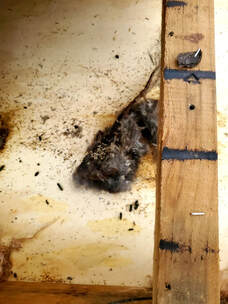
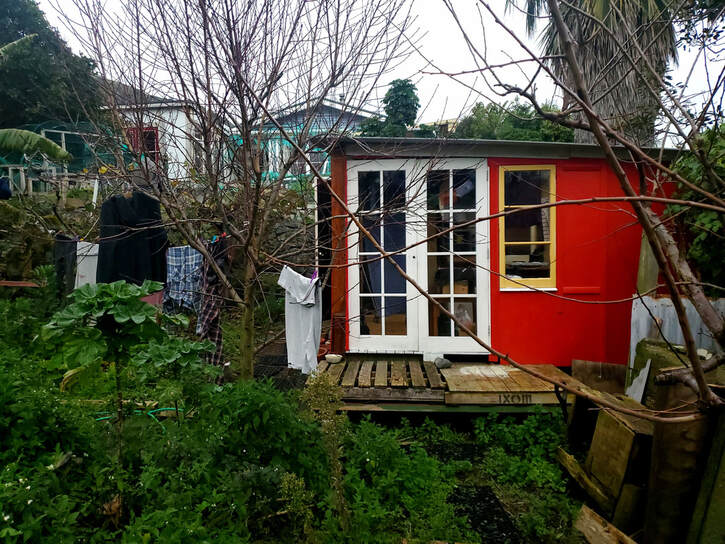
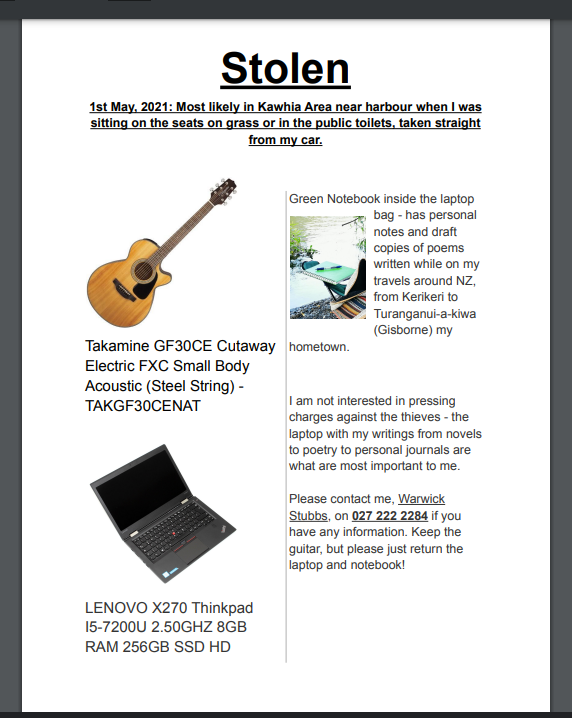
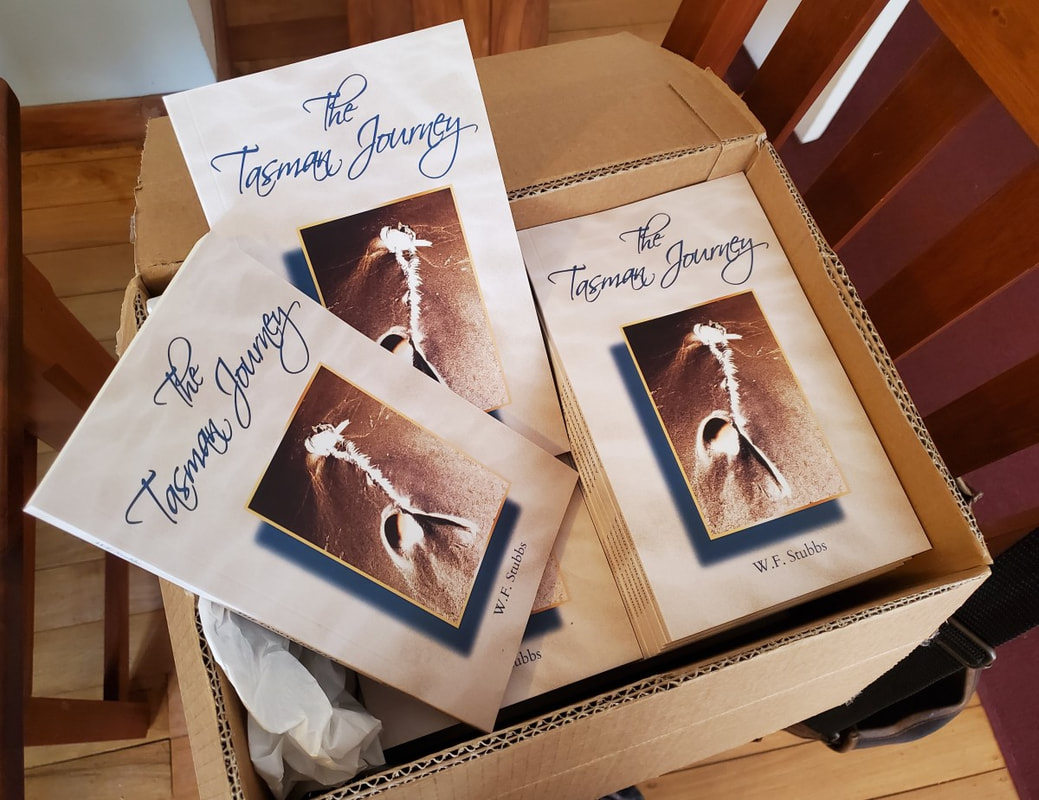
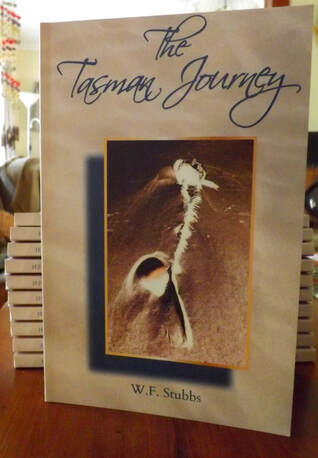
 RSS Feed
RSS Feed